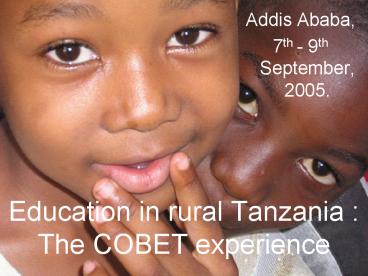Education in rural Tanzania : The COBET experience - PowerPoint PPT Presentation
1 / 14
Title:
Education in rural Tanzania : The COBET experience
Description:
Universal Primary Education achievement in 1970's, 1980's (254% increase, ... No Fees, School uniform, Caning. Special Focus on Girls, Vulnerable Children ... – PowerPoint PPT presentation
Number of Views:137
Avg rating:3.0/5.0
Title: Education in rural Tanzania : The COBET experience
1
Education in rural Tanzania The COBET experience
- Addis Ababa,
- 7th - 9th September, 2005.
2
Background
COBET
- Universal Primary Education achievement in
1970s, 1980s (254 increase, Grade
1(1974-1978) - - Gross Enrollment Ratio 98
- - 11,290 public facilities
- Mid 1980s 1990s - chronic persistent
problems in access, quality, resource allocation
and management - Accumulation of over-aged school children
(enrollment at 9.5 years) 4 million
out-of-school children (source school mapping
1997-1999) - Ratification for International treaties,
including CRC putting child at the centre of
learning - National policies for education reform ESDP
(2000-2015) PEDP (2002-6) Vision 2025 PRS II
(NSGRP or MKUKUTA) - Inception of COBET, to cater for out-of-school
aged children.
3
What is COBET?
- Complementing Primary Education
- Child-friendliness in
- - Curriculum,
- - Pedagogy and Facilitation
- (Inter-active, participatory methodology),
- No Fees, School uniform, Caning
- Special Focus on Girls, Vulnerable Children
- Full District and Community Involvement
4
COBET Piloting
- 50 COBET Centres in 5 Learning Districts
- 3 year cycle materials developed
- Regular Training of Facilitators
- Learning opportunity for 1,530 Children
- (40 Most Vulnerable Children)
- Best Practices Influenced Quality Improvements in
Primary Education
5
Most vulnerable childrenout of school
6
COBET centres Enrollment of orphans and other
vulnerable children
7
Implementation
COBET
- Main steps
- School mapping
- Tracer study of out-of-school children
- Needs assessment
- Development of curriculum teaching/learning
materials - Identification of premises, teachers/para-professi
onals, learners - Establishment of governance structures and
definition of roles and responsibilities - Training on the use of curriculum, governance
structures - Opening centres
- 2. Partners
- MoEC and its related institutions(TIE, IAE,
NECTA) - Communities (including children) in 5 districts
- Local Government (districts)
- Selected NGOs
- UNICEF
8
Accessible to hard to reach Children -
Flexible Time Schedule- Second chance to
Drop-outs and Pregnant girls- Less direct costs
(no uniforms, no desks)- Shorter learning
cycle3 Vs 7 years- Responsive Curriculum
(Life-Skills, HIV/AIDS)- Child-centered
approach - Community participation - Safe
environment - Maximum Time on Task
COBET for the Girls Education in rural areas
9
Main results
COBET
- COBET Scaling-up through PEDP
- COBET Curriculum for 11-13 year olds
- Change in Location From Centres to Primary
School Settings - 1 Registering into Existing Primary Schools
- 2 Setting centres in rural wards
- 3 NGOs, CBOs, FBOs support
- Change in Organization Structures
- From COBET Centre Communities to School
Communities - Change in Pedagogy
- From Inter-Active, Participatory by Facilitators
to Formal Primary School Teachers
10
..
11
Challenges
COBET
- Quality assurance
- implementation in all 120 districts of Tanzania
Mainland, given financial, human, physical
constraints, especially for nomadic children - - Weak co-ordination between different
development partners supporting COBET
12
Way forward ?
COBET
- Co-ordination mechanism for quality assurance to
support COBET - Linkages with on-going development initiatives
for pre-primary schooling - Conceptualization and development of
Complementary Secondary Education In Tanzania
(COSET).
13
Lessons learnt
COBET
- COBET has transformed basic education in Tanzania
through the participation of children and
communities residing in rural districts - 2. By focussing on girls education, ALL children
acquire minimum quality learning.
14
Thank you for listening!!

